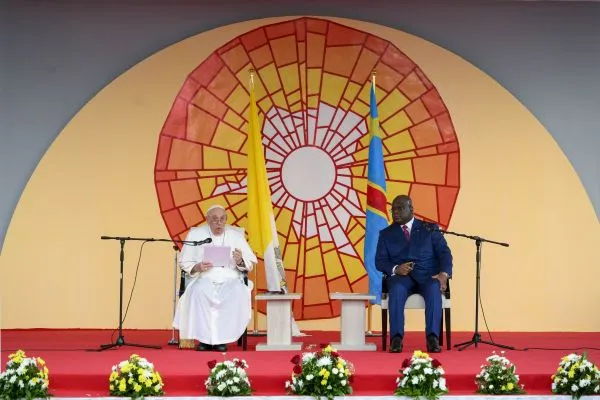He added, “Many young people are leaving the traditional Eurocentric tradition, not only of Catholicism, but also of the mainland Churches, and are finding a home in the Pentecostal and evangelical groups in Africa.”
“There is a strong divide which Pope Francis is trying to break by creating the freedom that we didn’t have in Africa until now, to speak our voices and to reinvent Catholicism in Africa,” the Professor at DePaul University said.
Fr. Stan Ilo described Pope Francis as “one of the greatest reforming Popes of our modern time”, and added, “Pope Francis is for decentralization… Clerically, he isn’t someone who just wants to remain at the level of what Bishops and Priests are doing.”
The Nigerian-born Catholic Priest maintained that the Holy Father intends to listen to the cry of the suffering in DRC and South Sudan, and not to impose any solutions to the ailing countries.
“The Pope is going not to impose, but rather to listen to the cries of the people, especially the ordinary poor. People who are staying outside in the peripheries, those not always seen,” the Catholic Priest who, November last year, coordinated the Holy Father’s conversation with the youth in Africa, said.
(Story continues below)
Lamb echoed Fr. Stan’s sentiments, saying that Pope Francis does not have any specific policies that he would love to see implemented to restore peace in DRC and South Sudan.
The Holy Father, Lamb said, “comes as a person of faith.”
“He comes to change the minds and hearts of people. A million people are turning up for Mass in DRC. That is a strong soft power influence. It is very strong spiritual influence,” the Catholic Journalist said.
He added, “In South Sudan, we are going to see similar soft power influence to try to get the warring leaders to agree to peace.”
Pope Francis landed in Juba, South Sudan on Friday, February 3 afternoon for the second leg of his two African nation trip, which began in the capital of DRC, Kinshasa, on January 31.
In his speech at the Presidential Palace, Pope Francis begged political leaders in South Sudan to work together to put an end to bloody conflict and violence in their country.
“In the name of God, of the God to whom we prayed together in Rome, of the God who is gentle and humble in heart, the God in whom so many people of this beloved country believe, now is the time to say ‘No more of this,’ we say no more, without ‘ifs’ or ‘buts,’” the Holy Father said, making reference to the April 2019 encounter that culminated in a dramatic gesture to President Kiir, and opposition leader Dr. Riek Machar, among other South Sudanese politicians.
In his last official activity of his first day in South Sudan, Pope Francis alongside Archbishop Welby and Rt. Rev. Greenshields engaged with authorities and members of the diplomatic corps in the garden of the Presidential Palace.
On Saturday, February 4, Pope Francis is to meet with Bishops, members of the Clergy, women and men Religious, and Seminarians at St. Theresa's Cathedral of Juba Archdiocese.
He is then scheduled to meet privately with Jesuits in South Sudan in the Apostolic Nunciature.
The Pope is also expected to visit internally displaced persons (IDPs) at Freedom Hall in Juba.
In the evening, the Holy Father has been scheduled to participate in an ecumenical prayer service alongside Archbishop Welby and Rev. Greenshields at the John Garang Mausoleum.
The same venue is scheduled to host Holy Mass on the morning of the last day of the ecumenical trip, on Sunday, February 5, to be followed by a farewell ceremony at Juba international airport at midmorning before Pope Francis leaves for Rome.
Agnes Aineah is a Kenyan journalist with a background in digital and newspaper reporting. She holds a Master of Arts in Digital Journalism from the Aga Khan University, Graduate School of Media and Communications and a Bachelor's Degree in Linguistics, Media and Communications from Kenya's Moi University. Agnes currently serves as a journalist for ACI Africa.








